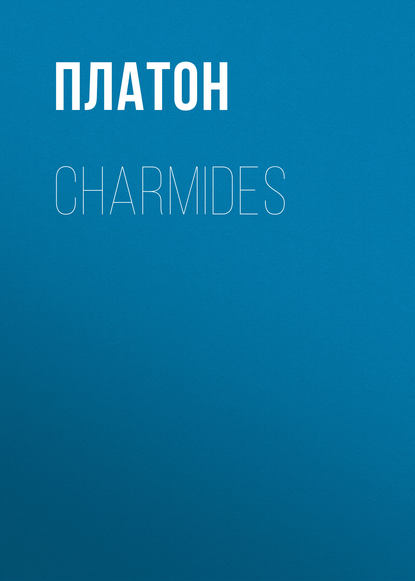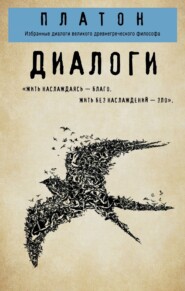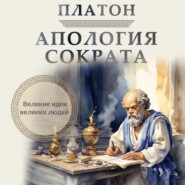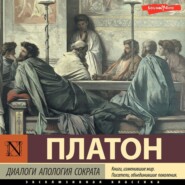По всем вопросам обращайтесь на: info@litportal.ru
(©) 2003-2024.
✖
Charmides
Настройки чтения
Размер шрифта
Высота строк
Поля
Or of an opinion which is an opinion of itself and of other opinions, and which has no opinion on the subjects of opinion in general?
Certainly not.
But surely we are assuming a science of this kind, which, having no subject-matter, is a science of itself and of the other sciences?
Yes, that is what is affirmed.
But how strange is this, if it be indeed true: we must not however as yet absolutely deny the possibility of such a science; let us rather consider the matter.
You are quite right.
Well then, this science of which we are speaking is a science of something, and is of a nature to be a science of something?
Yes.
Just as that which is greater is of a nature to be greater than something else? (Socrates is intending to show that science differs from the object of science, as any other relative differs from the object of relation. But where there is comparison – greater, less, heavier, lighter, and the like – a relation to self as well as to other things involves an absolute contradiction; and in other cases, as in the case of the senses, is hardly conceivable. The use of the genitive after the comparative in Greek, (Greek), creates an unavoidable obscurity in the translation.)
Yes.
Which is less, if the other is conceived to be greater?
To be sure.
And if we could find something which is at once greater than itself, and greater than other great things, but not greater than those things in comparison of which the others are greater, then that thing would have the property of being greater and also less than itself?
That, Socrates, he said, is the inevitable inference.
Or if there be a double which is double of itself and of other doubles, these will be halves; for the double is relative to the half?
That is true.
And that which is greater than itself will also be less, and that which is heavier will also be lighter, and that which is older will also be younger: and the same of other things; that which has a nature relative to self will retain also the nature of its object: I mean to say, for example, that hearing is, as we say, of sound or voice. Is that true?
Yes.
Then if hearing hears itself, it must hear a voice; for there is no other way of hearing.
Certainly.
And sight also, my excellent friend, if it sees itself must see a colour, for sight cannot see that which has no colour.
No.
Do you remark, Critias, that in several of the examples which have been recited the notion of a relation to self is altogether inadmissible, and in other cases hardly credible – inadmissible, for example, in the case of magnitudes, numbers, and the like?
Very true.
But in the case of hearing and sight, or in the power of self-motion, and the power of heat to burn, this relation to self will be regarded as incredible by some, but perhaps not by others. And some great man, my friend, is wanted, who will satisfactorily determine for us, whether there is nothing which has an inherent property of relation to self, or some things only and not others; and whether in this class of self-related things, if there be such a class, that science which is called wisdom or temperance is included. I altogether distrust my own power of determining these matters: I am not certain whether there is such a science of science at all; and even if there be, I should not acknowledge this to be wisdom or temperance, until I can also see whether such a science would or would not do us any good; for I have an impression that temperance is a benefit and a good. And therefore, O son of Callaeschrus, as you maintain that temperance or wisdom is a science of science, and also of the absence of science, I will request you to show in the first place, as I was saying before, the possibility, and in the second place, the advantage, of such a science; and then perhaps you may satisfy me that you are right in your view of temperance.
Critias heard me say this, and saw that I was in a difficulty; and as one person when another yawns in his presence catches the infection of yawning from him, so did he seem to be driven into a difficulty by my difficulty. But as he had a reputation to maintain, he was ashamed to admit before the company that he could not answer my challenge or determine the question at issue; and he made an unintelligible attempt to hide his perplexity. In order that the argument might proceed, I said to him, Well then Critias, if you like, let us assume that there is this science of science; whether the assumption is right or wrong may hereafter be investigated. Admitting the existence of it, will you tell me how such a science enables us to distinguish what we know or do not know, which, as we were saying, is self-knowledge or wisdom: so we were saying?
Yes, Socrates, he said; and that I think is certainly true: for he who has this science or knowledge which knows itself will become like the knowledge which he has, in the same way that he who has swiftness will be swift, and he who has beauty will be beautiful, and he who has knowledge will know. In the same way he who has that knowledge which is self-knowing, will know himself.
I do not doubt, I said, that a man will know himself, when he possesses that which has self-knowledge: but what necessity is there that, having this, he should know what he knows and what he does not know?
Because, Socrates, they are the same.
Very likely, I said; but I remain as stupid as ever; for still I fail to comprehend how this knowing what you know and do not know is the same as the knowledge of self.
What do you mean? he said.
This is what I mean, I replied: I will admit that there is a science of science; – can this do more than determine that of two things one is and the other is not science or knowledge?
No, just that.
But is knowledge or want of knowledge of health the same as knowledge or want of knowledge of justice?
Certainly not.
The one is medicine, and the other is politics; whereas that of which we are speaking is knowledge pure and simple.
Very true.
And if a man knows only, and has only knowledge of knowledge, and has no further knowledge of health and justice, the probability is that he will only know that he knows something, and has a certain knowledge, whether concerning himself or other men.
True.
Then how will this knowledge or science teach him to know what he knows? Say that he knows health; – not wisdom or temperance, but the art of medicine has taught it to him; – and he has learned harmony from the art of music, and building from the art of building, – neither, from wisdom or temperance: and the same of other things.
That is evident.
How will wisdom, regarded only as a knowledge of knowledge or science of science, ever teach him that he knows health, or that he knows building?
It is impossible.
Then he who is ignorant of these things will only know that he knows, but not what he knows?
True.
Then wisdom or being wise appears to be not the knowledge of the things which we do or do not know, but only the knowledge that we know or do not know?
That is the inference.
Then he who has this knowledge will not be able to examine whether a pretender knows or does not know that which he says that he knows: he will only know that he has a knowledge of some kind; but wisdom will not show him of what the knowledge is?
Plainly not.
Neither will he be able to distinguish the pretender in medicine from the true physician, nor between any other true and false professor of knowledge. Let us consider the matter in this way: If the wise man or any other man wants to distinguish the true physician from the false, how will he proceed? He will not talk to him about medicine; and that, as we were saying, is the only thing which the physician understands.

















